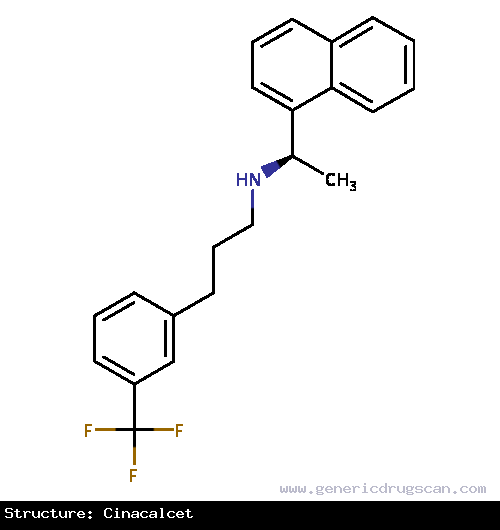Cinacalcet Drug: Indication, Dosage, Precaution, Side Effect , Storage, Category Type and corresponding Brands - www.genericdrugscan.com
Cinacalcet
Drug Status in USA : ApprovedDrug Status in Canada : Approved
pronunciation
pronounced as (sin a cal' set)
Why is this medication prescribed?
Cinacalcet is used alone or with other medications to treat secondary hyperparathyroidism (a condition in which the body produces too much parathyroid hormone
- a natural substance needed to control the amount of calcium in the blood
How should this medicine be used?
Cinacalcet comes as a tablet to take by mouth. It is usually taken once a day with food or shortly after a meal. To help you remember to take cinacalcet, take it at around the same time every day. Follow the directions on your prescription label carefully, and ask your doctor or pharmacist to explain any part you do not understand. Take cinacalcet exactly as directed. Do not take more or less of it or take it more often than prescribed by your doctor.
Swallow the tablets whole; do not split, chew, or crush them.
Your doctor will probably start you on a low dose of cinacalcet and gradually increase your dose, not more than once every 2-4 weeks.
Cinacalcet may help control your condition but will not cure it. Continue to take cinacalcet even if you feel well. Do not stop taking cinacalcet without talking to your doctor.
What are the precautions to be followed?
Before taking cinacalcet,- tell your doctor and pharmacist if you are allergic to cinacalcet or any other medications.
- tell your doctor and pharmacist what prescription and nonprescription medications, vitamins, nutritional supplements, and herbal products you are taking. Be sure to mention any of the following: antidepressants (mood elevators) such as amitriptyline (Elavil), clomipramine (Anafranil), desipramine (Norpramin), fluoxetine (Prozac, Sarafem), imipramine (Tofranil), nefazodone, nortriptyline (Aventyl, Pamelor), paroxetine (Paxil), protriptyline (Vivactil) and trimipramine (Surmontil); antifungals such as fluconazole (Diflucan), itraconazole (Sporanox), and ketoconazole (Nizoral); cimetidine (Tagamet); cyclosporine (Neoral, Sandimmune); danazol (Danocrine); delavirdine (Rescriptor); diltiazem (Cardizem, Dilacor, Tiazac); erythromycin (E.E.S., E-Mycin, Erythrocin); flecainide (Tambocor); HIV protease inhibitors such as indinavir (Crixivan) and ritonavir (Norvir); isoniazid (INH, Nydrazid); metronidazole (Flagyl); oral contraceptives (birth control pills); thioridazine (Mellaril); troleandomycin (TAO); verapamil (Calan, Covera, Isoptin, Verelan); vinblastine (Velban); and zafirlukast (Accolate). Your doctor may need to change the doses of your medications or monitor you carefully for side effects.
- tell your doctor if you have or have ever had seizures or liver disease.
- tell your doctor if you are pregnant, plan to become pregnant, or are breast-feeding. If you become pregnant while taking cinacalcet, call your doctor.
What are possible side effects of this medication ?
Cinacalcet may cause side effects. Tell your doctor if any of these symptoms are severe or do not go away:- upset stomach
- vomiting
- diarrhea
- dizziness
- weakness
- chest pain
- burning, tingling, or unusual feelings of the lips, tongue, fingers, or feet
- muscle aches or cramps
- sudden tightening of the muscles in the hands, feet, face, or throat
- seizures
- infection of dialysis access (surgically created blood vessel where blood leaves and enters the body during dialysis)
Cinacalcet may cause other side effects. Call your doctor if you have any unusual problems while taking this medication.
How to store the medication and dispose it of after its use later?
Keep this medication in the container it came in, tightly closed, and out of reach of children. Store it at room temperature and away from excess heat and moisture (not in the bathroom).
Unneeded medications should be disposed of in special ways to ensure that pets, children, and other people cannot consume them. However, you should not flush this medication down the toilet. Instead, the best way to dispose of your medication is through a medicine take-back program.
Drug Category/Class
- Systemic Hormonal Preparations, Excl. Sex Hormones and Insulins
- Anti-Parathyroid Agents
- Calcium Homeostasis
- Calcimimetic Agents
- CYP2D6 Inducers
- CYP2D6 Inducers (strong)
- CYP3A4 Inhibitors
- Cytochrome P-450 CYP1A2 Inhibitors
- Cytochrome P-450 CYP1A2 Inducers
- Other anti-parathyroid agents
| Prescribed | For the treatment of secondary hyperparathyroidism in patients with Chronic Kidney Disease who are on hemodialysis or peritoneal dialysis. Also for... |
| Weight : | 357.412 |
| Structure | Cinacalcet |
 | |
| Formula | C22H22F3N |
Cinacalcet has 2 Brands listed
| Pth (30 mg) | Pth (60 mg) |
Search Generic Drugs alphabetically
